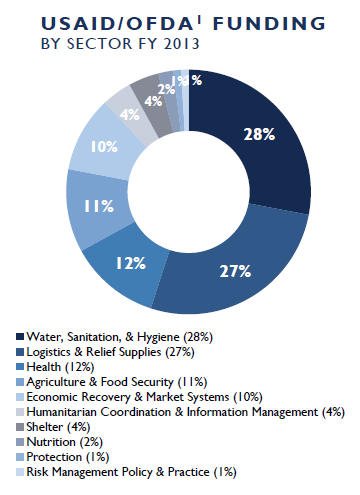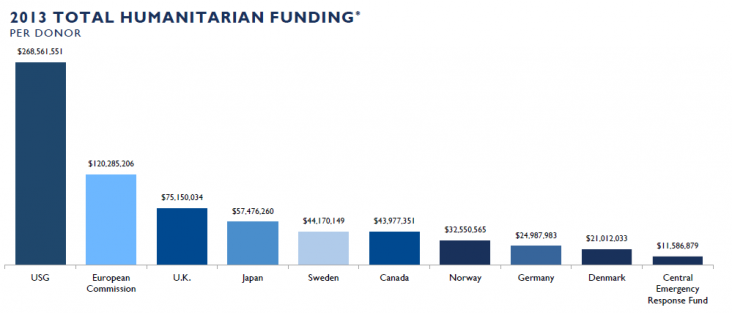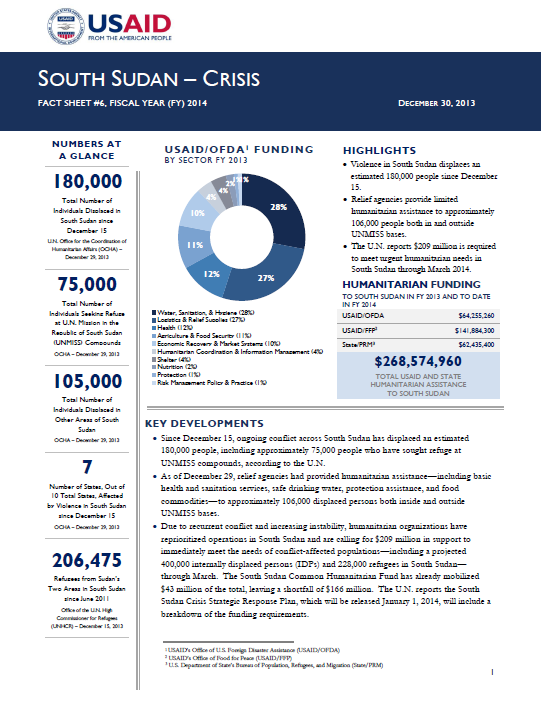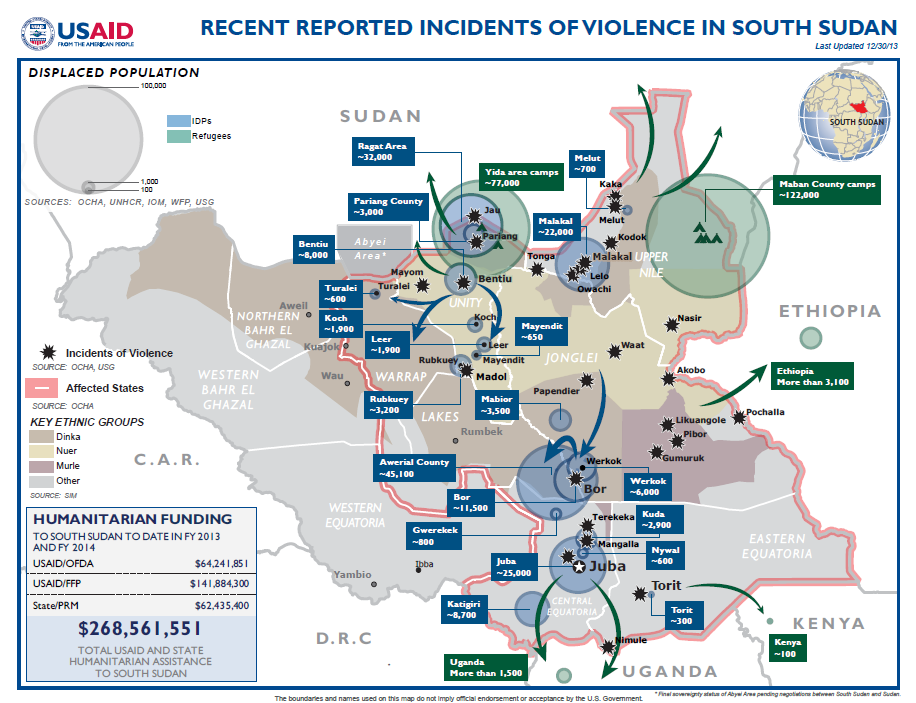- What We Do
- Agriculture and Food Security
- Democracy, Human Rights and Governance
- Economic Growth and Trade
- Education
- Environment and Global Climate Change
- Gender Equality and Women's Empowerment
- Global Health
- Humanitarian Assistance
- Transformation at USAID
- Water and Sanitation
- Working in Crises and Conflict
- U.S. Global Development Lab
Speeches Shim
December 30, 2013
Numbers At A Glance
180,000
75,000
105,000
7
206,475
Humanitarian Funding:
To South Sudan To Date In FY2013 and FY2014:

| USAID/OFDA | $64,255,260 |
| USAID/FFP | $141,884,300 |
| State/PRMDoD | $62,435,400 |
| TOTAL | $268,574,960 |
Highlights
Violence in South Sudan displaces an estimated 180,000 people since December 15.
Relief agencies provide limited humanitarian assistance to approximately 106,000 people both in and outside UNMISS bases.
The U.N. reports $209 million is required to meet urgent humanitarian needs in South Sudan through March 2014.
Key Developments
Since December 15, ongoing conflict across South Sudan has displaced an estimated 180,000 people, including approximately 75,000 people who have sought refuge at UNMISS compounds, according to the U.N.
As of December 29, relief agencies had provided humanitarian assistance—including basic health and sanitation services, safe drinking water, protection assistance, and food commodities—to approximately 106,000 displaced persons both inside and outside UNMISS bases.
Due to recurrent conflict and increasing instability, humanitarian organizations have reprioritized operations in South Sudan and are calling for $209 million in support to immediately meet the needs of conflict-affected populations—including a projected 400,000 internally displaced persons (IDPs) and 228,000 refugees in South Sudan—through March. The South Sudan Common Humanitarian Fund has already mobilized $43 million of the total, leaving a shortfall of $166 million. The U.N. reports the South Sudan Crisis Strategic Response Plan, which will be released January 1, 2014, will include a breakdown of the funding requirements.
SITUATION AND DISPLACEMENT UPDATE
The security situation across conflict-affected areas in South Sudan remains fluid. The U.N. reports continued clashes in Upper Nile and Jonglei states between December 27 and 29, while a lull in violence in some main towns has facilitated the delivery of much-needed humanitarian supplies. The situation in the capital city of Juba remains tense but calm, allowing for continued scaling up of humanitarian activities.
According to the U.N., heavy clashes in Malakal, Upper Nile State, have resulted in increased population displacement in recent days, with the number of IDPs in the UNMISS base rising from 12,000 to 22,000 between December 26 and 29. The U.N. also indicates outbreaks of violence in new locations in Jonglei State, including Twic East County, and international media reports that opposition groups are moving toward Bor, the state capital of Jonglei, with clashes reported north of Bor on December 29. The situation in Bentiu remains tense, and reports continue to suggest fighting may resume in the coming days, according to the U.N.
Continued clashes and insecurity is displacing South Sudanese to nearby countries. The UN reports more than 100 South Sudanese refugees arriving in Kenya, 1,540 in Uganda, and 3,100 in Ethiopia in recent days. Aid agencies also report that approximately 1,850 South Sudanese crossed from Unity State to Sudan’s South Kordofan State.
Relief agencies note significant protection concerns in conflict-affected areas of South Sudan, with reports indicating targeting and harassment of civilians. The U.N. anticipates that protection concerns will likely increase for populations residing in UNMISS compounds, due to challenging living conditions and the fluid security situation. While agencies are conducting protection monitoring in Juba, aid agencies report more robust monitoring is needed outside of Juba—where insecurity and access continue to restrict movement.
Despite recent clashes or anticipated violence, relative periods of calm in Bentiu, Bor, and Malakal have facilitated the delivery of emergency relief supplies, including water, sanitation, and hygiene (WASH) and medical supplies, according to the U.N. As of December 29, relief agencies had provided humanitarian assistance—including basic health and sanitation services, safe drinking water, protection assistance, and food commodities—to approximately 106,000 displaced persons both inside and outside UNMISS bases. U.N. agencies and relief organizations continue to prioritize the delivery of humanitarian assistance to people in need where security allows, focusing on immediate food, health care, protection, shelter, and WASH needs.
South Sudan Crisis Fact Sheet #6 December 30, 2013 ![]() (pdf - 352k)
(pdf - 352k)
HUMANITARIAN RESPONSE IN JUBA, CENTRAL EQUATORIA STATE
Relief agencies continue robust efforts to provide humanitarian assistance to populations sheltering at UNMISS bases in Juba, including approximately 14,000 individuals in the Tong Ping compound and 11,000 people at U.N. House 3. Humanitarian agencies are closely monitoring the WASH and health situations, and continue to enhance humanitarian assistance efforts to prevent the outbreak of disease.
Humanitarian partners launched a measles and polio vaccination campaign for children sheltering in the UNMISS Tong Ping site on December 29, targeting 7,000 children between 6 months and 15 years of age with measles vaccines and all children 15 years of age and younger with polio vaccines. Health workers plan to initiate a similar vaccination campaign at U.N. House 3 in the coming days.
The WASH situation in Juba IDP sites is improving, with relief organizations constructing a total of 420 latrines at the two UNMISS compounds as of December 29 and providing 11 liters per person per day of safe drinking water in Tong Ping and 12 liters per person per day in U.N. House 3—an increase from 10 liters and 6 liters, respectively, as of December 26.
As of December 29, approximately 6,550 families in Juba had received one-week food rations, including more than 4,700 children who received high-energy biscuits, according to the U.N.
South Sudan Crisis Map December 30, 2013 ![]() (pdf - 413k)
(pdf - 413k)
HUMANITARIAN RESPONSE IN OTHER AREAS OF SOUTH SUDAN
Humanitarian agencies continue efforts to provide critical humanitarian assistance to areas outside of Juba, as security, staffing, and access permit, and are scaling up assessment activities to identify priority needs among affected communities. A break in violence in some areas has facilitated the delivery of much-needed humanitarian assistance to some major towns hosting IDP populations. U.N. agencies and relief are focusing relief activities on immediate food, health care, protection, shelter, and WASH needs.
In addition to assistance provided by local authorities, relief organizations have provided food commodities and other relief items—including medical supplies—to at least 30,000 IDPs in Awerial County, Lakes State, according to the U.N. The U.N. World Food Program (WFP) plans to conduct assessments in Awerial County on December 31 to identify additional needs among the estimated 45,000 people displaced in Awerial from Bor, Jonglei State.
Camp management staff have traveled to the UNMISS base in Malakal, Upper Nile, which has received an additional 10,000 IDPs in recent days due to nearby clashes, to assess conditions. The U.N. reports that health, WASH, food assistance, and emergency relief commodities are top priorities for populations residing in the base. To address humanitarian needs, relief agencies initiated a food distribution in the UNMISS base on December 29 and are making preparations for latrine construction. Aid agencies also plan to distribute water bladders and water containers to improve the availability and distribution of safe drinking water in the compound.
At the UNMISS Base in Bor, Jonglei State, the U.N. highlights the need for WASH supplies, as well as staff to implement sanitation activities. On December 29, a WASH team in Bor began distributing soap for 960 families and water purification tablets for 800 families to help address the sanitation gap.
In Unity State, where IDP populations are residing in UNMISS compounds in Bentiu and Pariang, as well as outside of UNMISS compounds in Koch, Leer, and Mayendit counties, agencies have identified health and WASH as priority sectors, with partners having identified three suspected measles cases at the UNMISS base in Bentiu. The U.N. reports the availability of WASH supplies in Bentiu, although the need for additional staff to conduct WASH interventions.
2013 TOTAL HUMANITARIAN FUNDING*

*Funding figures are as of December 30, 2013. All international figures are according to OCHA’s Financial Tracking Service and based on international commitments during the 2013 calendar year, while USG figures are according to the USG and reflect the most recent USG commitments based on the 2013 fiscal year, which began on October 1, 2012, and ended September 30, 2013, as well as the 2014 fiscal year, which began on October 1, 2013.



Comment
Make a general inquiry or suggest an improvement.